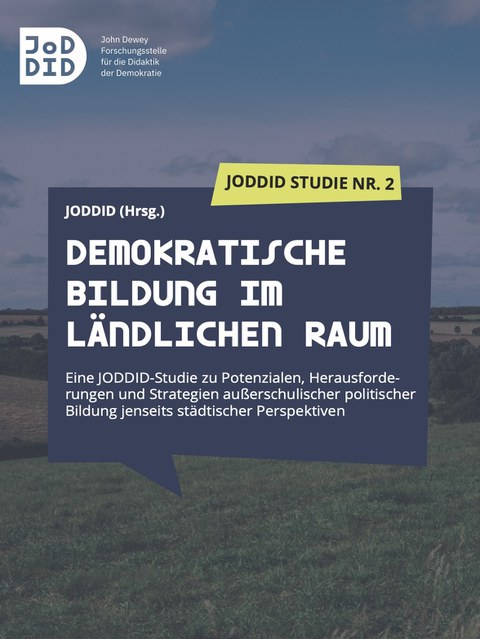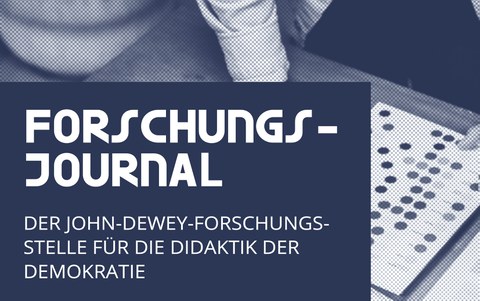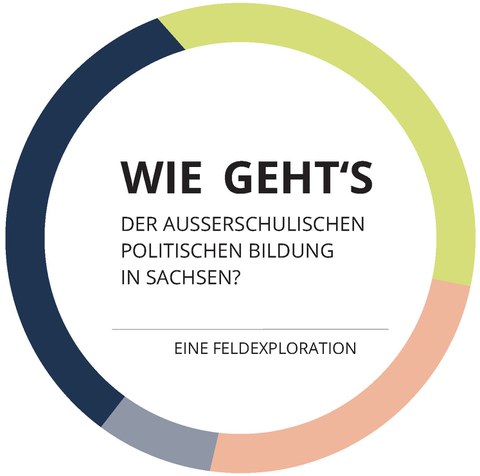Research
JoDDiD pursues an integrative research concept that does not rely solely on the implementation of proven studies, but assumes that important research data can be collected in all of the research center's work processes.
Previous publications
The study Democratic Education in the 'Funding Jungle' examines the complex financing and funding structure of extracurricular civic education in Saxony. Based on guided interviews and a research-practice dialog with stakeholders from politics, administration and educational projects, the analysis sheds light on the thicket-like Saxon funding landscape and highlights the associated challenges. Subsequently, solutions and recommendations for action are derived. These should help to increase the efficiency of funding allocation and facilitate the work of project sponsors in order to ultimately improve the quality and sustainability of political education work in Saxony.
Click here for the study
The study on democratic education in rural areas explores the complex challenges and potential of political education in rural regions and discusses initial solutions. The results focus on the immediate relationships in rural areas, which are characterized by shared living environments and stable interaction networks, but also by the confrontation with constricted discourse spaces, conformity constraints and attacks.
In the first research journal, JoDDiD employees not only present initial research results from our studies, but also from all areas of work (innovation, consulting, education and training as well as transfer).
Click here for the research journal
JoDDiD conducted an online survey among those active in the field of extracurricular civic education in Saxony to find out more about their current challenges and wishes, as well as their biographical backgrounds, prerequisites and understanding of their work. The results were published in the form of a field exploration and a strategy paper.
Click here for the exploration study
We have been working for some time on the questions that move the field. In order to show which studies are relevant, we have produced short research dossiers on various topics.
Click here for the research dossiers
Research strategy
One example: We offer those active in the field of extracurricular political youth and adult education a space for discussion in which challenges and problems in the areas of activity can be discussed and worked on. In this context, however, it is inevitable that new insights into these challenges and problems will be condensed into findings at the research center, which can also be made visible in anonymized form. We have already had similar experiences in previous projects. For example, we had the opportunity to provide long-term advice and support to various schools in specifically developed consulting projects and to gain the trust of the stakeholders. This made it possible, for example, to gain deep insights into the challenges posed by misanthropic statements made by teachers. Similar potentials and questions for JoDDiD's research will also develop from the field of counseling.
A key factor in this context is the sustained penetration of the research field. Although an invisible approach that does not change the field as much as possible is understood as a quality criterion in research, various research designs from the field of ethnographic research as well as participatory action research approaches have shown the added value of researchers becoming part of the research field or even partially merging with it. Through such an approach, research succeeds not only in developing an external image of the research field through the "lens" of science, but also in synthesizing hypotheses about the inherent connections, interactions and often undiscovered factors in the complex system of practical educational settings and their contextual structures. The combination of trusting relationships between researchers and stakeholders in out-of-school civic education practice and innovative participatory field research enables JoDDiD to develop a research strategy tailored to the previously untapped field of out-of-school civic youth and adult education.
In summary, it can be said that the research center focuses on three main areas within its research strategy. These are
- Participatory research strategies, in which research questions are worked on together with those active in the field
- Design-based research strategies that generate knowledge about the field through the development of new (learning and organizational) designs and their implementation in the field, and
- Strategies borrowed from the field of ethnographic research, whose particular quality lies in the fact that they adopt an understanding-oriented perspective and seek to understand systems in their own logic through ongoing participatory observation.
In the sense of a mixed-methods design, JoDDiD draws on a variety of scientific instruments and methods that are adapted to the respective situations and practice partners and therefore only a selection can be outlined here. Classic methods such as various types of interviews, open and standardized written surveys, observations and evaluations are used, as well as experimental and innovative methods such as mapping methods, network analyses, subjective mapping, association methods or process diagnostic tools.





